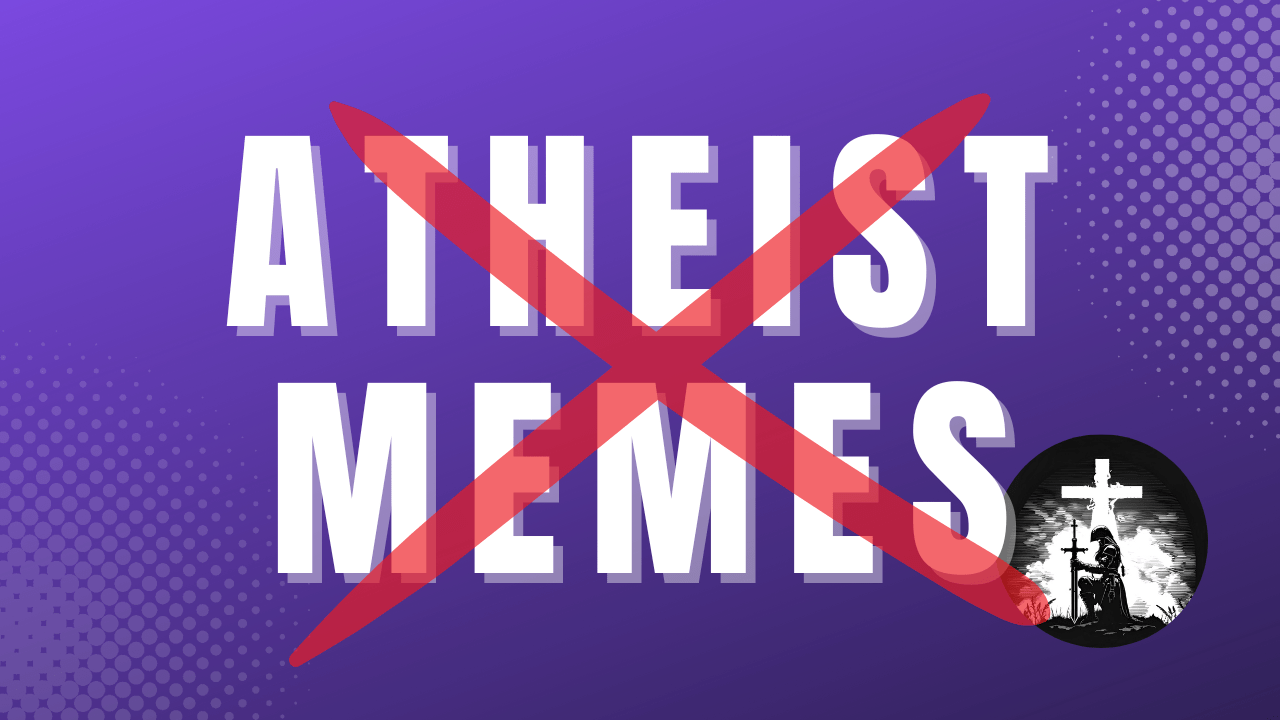Today we are going to learn how to respond to memes that atheists often share with us in an attempt to demonstrate that one can live an ethical life without religion. It is important that we know how to respond because memes are powerful tools for spreading messages.
This particular meme has several fallacies that we are going to debunk today. The meme suggests that we should not instill religions in children but focus on teaching ethics and virtues, allowing each individual to decide whether to believe or not. It portrays different religious figures thrown in the trash as if they were something worthless. However, from the Catholic perspective, faith and religion are fundamental components in the formation of a complete person.

- Faith as an ethical foundation: As Catholics, we believe that the existence of God is the ultimate foundation of morality and ethics. We maintain that God is the source of what is right and wrong, and that our relationship with God helps us discern and live according to His moral order. Denying the existence of God poses significant challenges in establishing an objective and universal basis for morality.
- Divine revelation: As Catholics, we believe that the Bible and Tradition contain divine revelation. It is not simply a personal choice but rather recognizing that God has revealed Himself through these sources. Transmitting this teaching to children gives them the opportunity to know and experience the truth revealed by God, enabling them to make informed decisions about their faith.
- Comprehensive formation: Religion is not limited to the ethical dimension but encompasses the entirety of the person. Religious education offers comprehensive formation that involves spiritual, intellectual, moral, emotional, and social aspects. It helps children understand their purpose in life, cultivate a relationship with God, and live according to transcendent principles and values.
- Free will: While it is important to respect each individual’s freedom to choose their faith, it is also essential to provide them with a solid foundation and appropriate religious education. Instilling the Catholic faith in children does not mean blindly imposing a belief on them, but rather providing them with the knowledge and understanding necessary to make informed decisions. Faith is not merely a personal choice but a search for truth and a response to God’s call.
- Atheistic ethics: There are atheists who are good people, that is undeniable. Some individuals may have a more relative or subjective understanding of morality without believing in the divine. However, here lies a serious problem because there exists a moral law that is objective and absolute. It is important to highlight that belief in the divine provides a solid framework for understanding morality and its objective foundations. Belief in God invites us to live according to a moral law that transcends our own preferences and individual desires, helping us discern what is truly good and just without falling into relativism.
All religions are the same.
On the other hand, the meme puts all religions on the same level, as if they all lead to the same God, so it doesn’t matter which religion or church we subscribe to. Does it matter which religion we practice? Let’s see:
- Revelation in Jesus Christ: The Catholic faith teaches that Jesus Christ is the incarnate Son of God, the Word made flesh. He is the way, the truth, and the life, and through Him, we can have a personal relationship with God the Father. Jesus claimed to be the only mediator between God and humanity, and His sacrifice on the cross is the only path to redemption and reconciliation with God.
- The Church founded by Christ: The Catholic Church, founded by Jesus Christ, is considered by Catholics to be the only Church that He established as the depositary and guardian of the fullness of the revealed truth. The Church, guided by the Holy Spirit, has the responsibility to teach, sanctify, and govern in the name of Christ. Therefore, it cannot be maintained that all religions lead to the same God since the fullness of divine truth is found in the Catholic Church.
- Diversity of religious beliefs: While it is true that there are elements of truth and moral values in different religions, not all religions share the same understanding of God, human nature, and salvation. Religious beliefs and practices differ significantly in fundamental aspects such as the nature of God, the divinity of Jesus Christ, grace, and the path to salvation. Religious diversity cannot simply be reduced to theological and spiritual unity.
- Evangelizing mission: The Catholic Church has the mission to bring the message of salvation in Jesus Christ to all people and all nations. This is based on the conviction that salvation is found only in Christ and the need for all human beings to know and respond to this call of love and mercy. Denying this truth would go against Christ’s mandate to make disciples of all nations.
In summary, from the Catholic perspective, instilling religion in children is not limiting their freedom but providing them with a comprehensive education that encompasses ethics, moral formation, and the development of a relationship with God. The Catholic faith offers a solid guide for living a virtuous life in harmony with the divine plan, which is essential in the education of children.

